Currently, both Bharti Airtel and Reliance Jio Infocomm offer 5G networks in all major cities across India
India is expected to reach 690 million subscribers in the 5G segment by the end of 2028, representing a growth of 2,125% compared to the current 5G subscriber base, according to a new report on India’s 5G economy and workforce needs.
The report stated that this expansion in the 5G market will expand mobile coverage in India from current 77% to 94% in 2028.
The report from staffing and labor specialist TeamLease Services, dubbed “India’s 5G rollout: Revolutionizing the People Supply Chain”, stated that India will need a skilled workforce of at least eight million by 2025 in order to fully harness the potential of 5G technology.
The report also mentions the industries that will experience the most substantial benefits from the implementation of 5G technology. Of the 297 companies surveyed, 80% highlighted that the primary beneficiaries of 5G would be the information technology (IT) and banking and financial services sectors. The report noted that these industries are anticipated to witness a significant enhancement in their operational efficiency and service delivery through the integration of 5G technology.
Education, gaming as well as retail and e-commerce emerged will also take advantage of the benefits of 5G.
Meanwhile, approximately 46% of Indian companies expressed optimism about job creation, projecting a range of 61% to 80% within the first year of 5G’s implementation.
Currently, both Bharti Airtel and Reliance Jio Infocomm offer 5G networks in all major cities across the country. While Jio is offering standalone 5G technology (SA), Airtel has opted for Non-Standalone 5G technology (NSA). It is yet unclear whether Vodafone Idea will opt for SA or NSA architecture.
Meanwhile, Vodafone Idea is in the final stage of negotiations with banks to secure funding, which will be key for the launch of its 5G network infrastructure in the country, according to a recent press report. According to this report, a senior official from the Department of Telecommunication (DoT), who explained that the carrier is likely to secure funding by June, which will enable the launch of 5G services that same month.
In January, the country’s Minister of Railways, Communications and Electronics and Information Technology Ashwini Vaishnaw, had said that state-run operator BSNL could launch 5G technology in March 2024. Vaishnaw also clarified that initially, BSNL’s 5G network will be based on the NonStandalone (NSA) architecture.
India’s Department of Telecommunication (DoT) has reportedly decided that it will not directly allocate 5G spectrum to enterprises for the deployment of private 5G networks.
The DoT is now against direct allocation of frequencies because it believes it is not feasible under the current legal framework. In March, India’s Attorney General R Venkataramani had advised the DoT to prioritize auctions for 5G spectrum.
The DoT will soon inform the Cabinet and the country’s Telecom Regulatory Authority of India (TRAI) about its final decision. This new decision goes against DoT’s initial guidelines on private networks that were released in 2022. These guidelines stipulated that firms looking to set up their own private networks could lease 5G spectrum from telecom operators or get it directly from the DoT—as opposed to such spectrum being auctioned.
Local carriers had expressed their opposition to these guidelines, following which DoT consulted the Attorney General, who said that auctions are the preferred mode of allocating resources like spectrum.

